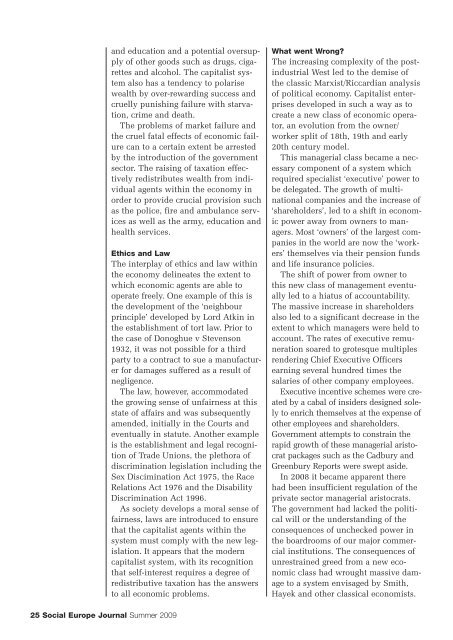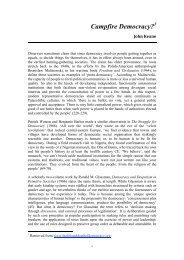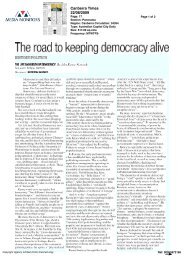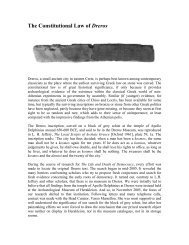The Ethics of Capitalism - Social Europe Journal
The Ethics of Capitalism - Social Europe Journal
The Ethics of Capitalism - Social Europe Journal
You also want an ePaper? Increase the reach of your titles
YUMPU automatically turns print PDFs into web optimized ePapers that Google loves.
and education and a potential oversupply<br />
<strong>of</strong> other goods such as drugs, cigarettes<br />
and alcohol. <strong>The</strong> capitalist system<br />
also has a tendency to polarise<br />
wealth by over-rewarding success and<br />
cruelly punishing failure with starvation,<br />
crime and death.<br />
<strong>The</strong> problems <strong>of</strong> market failure and<br />
the cruel fatal effects <strong>of</strong> economic failure<br />
can to a certain extent be arrested<br />
by the introduction <strong>of</strong> the government<br />
sector. <strong>The</strong> raising <strong>of</strong> taxation effectively<br />
redistributes wealth from individual<br />
agents within the economy in<br />
order to provide crucial provision such<br />
as the police, fire and ambulance services<br />
as well as the army, education and<br />
health services.<br />
<strong>Ethics</strong> and Law<br />
<strong>The</strong> interplay <strong>of</strong> ethics and law within<br />
the economy delineates the extent to<br />
which economic agents are able to<br />
operate freely. One example <strong>of</strong> this is<br />
the development <strong>of</strong> the ‘neighbour<br />
principle’ developed by Lord Atkin in<br />
the establishment <strong>of</strong> tort law. Prior to<br />
the case <strong>of</strong> Donoghue v Stevenson<br />
1932, it was not possible for a third<br />
party to a contract to sue a manufacturer<br />
for damages suffered as a result <strong>of</strong><br />
negligence.<br />
<strong>The</strong> law, however, accommodated<br />
the growing sense <strong>of</strong> unfairness at this<br />
state <strong>of</strong> affairs and was subsequently<br />
amended, initially in the Courts and<br />
eventually in statute. Another example<br />
is the establishment and legal recognition<br />
<strong>of</strong> Trade Unions, the plethora <strong>of</strong><br />
discrimination legislation including the<br />
Sex Discimination Act 1975, the Race<br />
Relations Act 1976 and the Disability<br />
Discrimination Act 1996.<br />
As society develops a moral sense <strong>of</strong><br />
fairness, laws are introduced to ensure<br />
that the capitalist agents within the<br />
system must comply with the new legislation.<br />
It appears that the modern<br />
capitalist system, with its recognition<br />
that self-interest requires a degree <strong>of</strong><br />
redistributive taxation has the answers<br />
to all economic problems.<br />
What went Wrong<br />
<strong>The</strong> increasing complexity <strong>of</strong> the postindustrial<br />
West led to the demise <strong>of</strong><br />
the classic Marxist/Riccardian analysis<br />
<strong>of</strong> political economy. Capitalist enterprises<br />
developed in such a way as to<br />
create a new class <strong>of</strong> economic operator,<br />
an evolution from the owner/<br />
worker split <strong>of</strong> 18th, 19th and early<br />
20th century model.<br />
This managerial class became a necessary<br />
component <strong>of</strong> a system which<br />
required specialist ‘executive’ power to<br />
be delegated. <strong>The</strong> growth <strong>of</strong> multinational<br />
companies and the increase <strong>of</strong><br />
‘shareholders’, led to a shift in economic<br />
power away from owners to managers.<br />
Most ‘owners’ <strong>of</strong> the largest companies<br />
in the world are now the ‘workers’<br />
themselves via their pension funds<br />
and life insurance policies.<br />
<strong>The</strong> shift <strong>of</strong> power from owner to<br />
this new class <strong>of</strong> management eventually<br />
led to a hiatus <strong>of</strong> accountability.<br />
<strong>The</strong> massive increase in shareholders<br />
also led to a significant decrease in the<br />
extent to which managers were held to<br />
account. <strong>The</strong> rates <strong>of</strong> executive remuneration<br />
soared to grotesque multiples<br />
rendering Chief Executive Officers<br />
earning several hundred times the<br />
salaries <strong>of</strong> other company employees.<br />
Executive incentive schemes were created<br />
by a cabal <strong>of</strong> insiders designed solely<br />
to enrich themselves at the expense <strong>of</strong><br />
other employees and shareholders.<br />
Government attempts to constrain the<br />
rapid growth <strong>of</strong> these managerial aristocrat<br />
packages such as the Cadbury and<br />
Greenbury Reports were swept aside.<br />
In 2008 it became apparent there<br />
had been insufficient regulation <strong>of</strong> the<br />
private sector managerial aristocrats.<br />
<strong>The</strong> government had lacked the political<br />
will or the understanding <strong>of</strong> the<br />
consequences <strong>of</strong> unchecked power in<br />
the boardrooms <strong>of</strong> our major commercial<br />
institutions. <strong>The</strong> consequences <strong>of</strong><br />
unrestrained greed from a new economic<br />
class had wrought massive damage<br />
to a system envisaged by Smith,<br />
Hayek and other classical economists.<br />
25 <strong>Social</strong> <strong>Europe</strong> <strong>Journal</strong> Summer 2009







